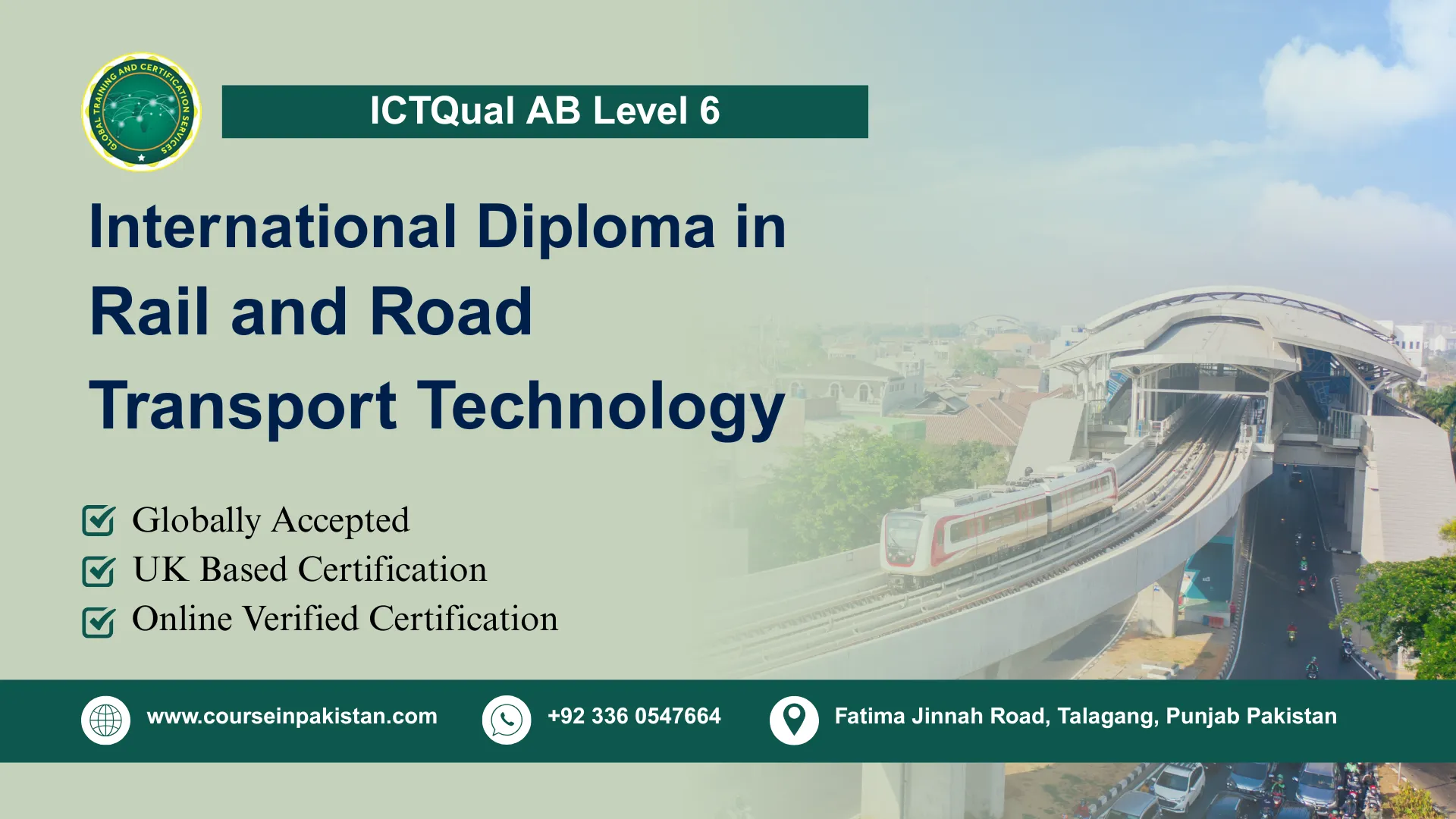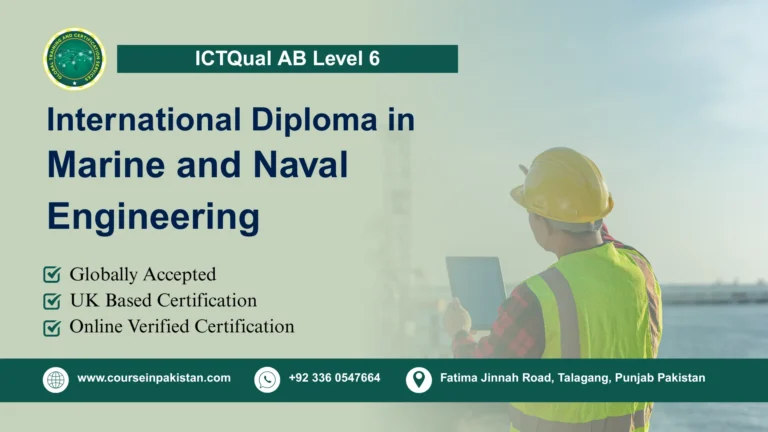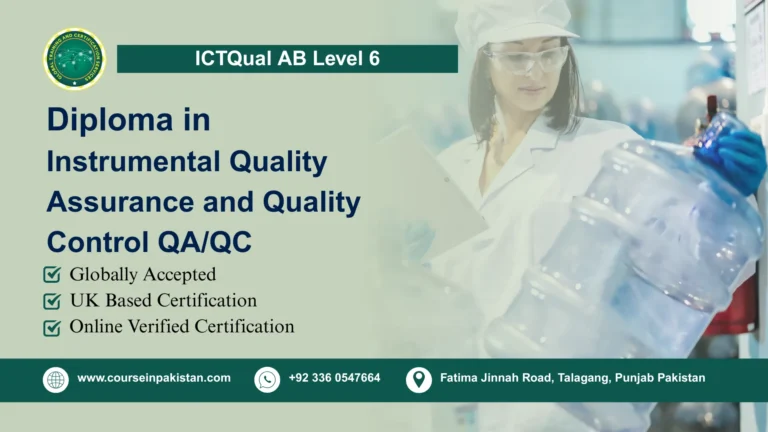
The ICTQual AB Level 6 International Diploma in Rail and Road Transport Technology is a comprehensive and career-focused program designed to provide learners with the advanced knowledge and practical expertise required in modern transportation industries. Covering both rail and road sectors, this qualification develops strong foundations in transport operations, vehicle technology, safety standards, sustainability, and innovation in mobility solutions. Learners are introduced to real-world applications, industry best practices, and advanced management strategies, preparing them to meet the demands of rapidly evolving global transport systems.
This diploma not only equips participants with technical competencies but also strengthens leadership, decision-making, and problem-solving skills tailored to transportation and logistics. With a focus on global standards, digital transformation, and sustainable practices, the program is highly relevant for those aiming to pursue careers in public transportation, infrastructure, fleet management, or intelligent transport systems.
Course Overview
The ICTQual AB Level 6 International Diploma in Rail and Road Transport Technology is a 360-credit program that can be completed flexibly. This certification is completely assignment-based, enabling learners to study at their own pace from anywhere in the world. It is British Council verifiable, MOFA and Embassy attested, making it highly credible for international employment, job approval, and iqama processing.
This qualification is suitable for both fresh and experienced candidates. Fresh learners are required to complete all 36 mandatory assignments within 3 years. However, experienced and competent professionals with at least 6 years of verifiable relevant experience can achieve this diploma faster by defending their knowledge and skills in professional discussion meetings with an ICTQual AB Approved Assessor, without completing all mandatory assessments. This flexible pathway ensures accessibility and recognition for both new learners and seasoned industry professionals.
Key Highlights of the Course:
- Globally recognized 360-credit diploma in Rail and Road Transport Technology.
- 100% assignment-based, flexible learning from anywhere in the world.
- British Council verifiable, MOFA and Embassy attested for international acceptance.
- Suitable for fresh learners and professionals with 6+ years of experience.
- Enhances career opportunities in transportation, logistics, and mobility industries.
Course Benefits
Global Recognition
- Internationally accepted qualification verified by British Council, MOFA, and Embassy.
- Enhances career credibility across rail, road, and logistics industries worldwide.
Career Growth Opportunities
- Opens doors to roles in transport management, operations, fleet supervision, and infrastructure development.
- Equips learners with knowledge to lead projects in intelligent and sustainable transportation systems.
Flexible Study Options
- Assignment-based structure allows learners to complete the course at their own pace.
- Experienced professionals can fast-track their certification through recognition of prior learning.
Practical and Industry-Relevant Knowledge
- Curriculum covers both technical aspects and management of transport systems.
- Focuses on sustainability, safety, innovation, and global best practices.
Enhanced Employability
- In-demand qualification for public and private sector organizations in transport and logistics.
- Boosts chances for job approval, iqama processing, and international placements.
Course Study Units
This qualification, the ICTQual AB Level 6 International Diploma in Rail & Road Transport Technology, consists of 36 mandatory units.
Year 1 – Foundations of Rail & Road Transport Technology
- Introduction to Rail & Road Transport Industry
- Principles of Transport Operations
- Transport Engineering Fundamentals
- Traffic Management and Control Systems
- Transport Law and Regulatory Frameworks
- Infrastructure Planning and Maintenance Basics
- Safety and Security in Rail & Road Transport
- Environmental Sustainability in Transport
- Logistics and Supply Chain Management
- Principles of Risk Management in Transport Operations
- Transport Economics and Policy
- Professional Ethics and Communication in Transport
Year 2 – Applied Transport Operations & Management
- Advanced Rail and Road Operations Planning
- Freight and Passenger Transport Management
- Transport Logistics Integration and Optimisation
- Infrastructure Project Management
- Safety Compliance and Risk Mitigation in Transport
- Crisis Management and Emergency Response
- Transport Finance, Budgeting, and Cost Control
- Environmental Compliance and Emissions Management
- Digitalisation and Smart Transport Technologies
- Human Resource Management in Transport Organisations
- Applied Case Studies in Transport Operations
- Operational Simulations and Practical Exercises
Year 3 – Strategic Leadership & Advanced Transport Management
- Strategic Management in Rail & Road Transport
- Transport Policy, Governance, and International Standards
- Legal Contracts and Regulatory Compliance in Transport
- Leadership and Decision-Making in Transport Operations
- Advanced Risk and Safety Management
- Infrastructure Planning and Strategic Development
- Global Supply Chain Management for Transport
- Emerging Technologies and Innovation in Transport
- Sustainability and Climate Change Adaptation in Transport
- Research Methods for Transport Technology
- Independent Research Project in Rail & Road Transport
- Capstone Project: Applied Strategic Transport Management
Learning Outcomes
Year 1 – Foundations of Rail & Road Transport Technology
Introduction to Rail & Road Transport Industry
- Understand the history, scope, and significance of rail and road transport sectors
- Identify the roles of transport systems in economic and social development
- Recognize the interconnectivity between road and rail operations
Principles of Transport Operations
- Explain core concepts of passenger and freight operations
- Apply operational planning techniques to transport services
- Analyse the factors influencing operational efficiency
Transport Engineering Fundamentals
- Understand the basics of mechanical and civil engineering in transport
- Identify key components of vehicles and infrastructure systems
- Apply engineering principles to solve simple transport challenges
Traffic Management and Control Systems
- Explain the principles of traffic flow and congestion management
- Assess modern control systems for road and rail networks
- Recommend solutions for safe and efficient traffic control
Transport Law and Regulatory Frameworks
- Identify key laws and regulations governing road and rail transport
- Interpret the impact of compliance on transport organisations
- Apply knowledge of legal frameworks in real operational scenarios
Infrastructure Planning and Maintenance Basics
- Explain fundamentals of transport infrastructure design and planning
- Recognize maintenance strategies for roads and railway systems
- Assess the importance of lifecycle management in infrastructure assets
Safety and Security in Rail & Road Transport
- Identify common hazards and risks in transport systems
- Apply safety protocols and procedures for risk minimisation
- Evaluate security challenges in public and freight transport operations
Environmental Sustainability in Transport
- Explain the environmental impact of transport activities
- Apply sustainability practices in transport operations
- Assess strategies for reducing emissions and resource consumption
Logistics and Supply Chain Management
- Understand the role of transport in supply chain systems
- Apply logistics principles to improve efficiency
- Evaluate integration of transport networks in supply chains
Principles of Risk Management in Transport Operations
- Identify risks within transport operations and systems
- Apply risk assessment and mitigation frameworks
- Evaluate organisational resilience strategies in transport contexts
Transport Economics and Policy
- Explain the economic role of transport in global trade and mobility
- Assess the influence of policy on transport pricing and access
- Apply economic principles to evaluate transport investment decisions
Professional Ethics and Communication in Transport
- Understand ethical responsibilities in transport management
- Apply professional communication skills in workplace settings
- Analyse the role of integrity in building stakeholder trust
Year 2 – Applied Transport Operations & Management
Advanced Rail and Road Operations Planning
- Develop advanced strategies for transport operations planning
- Apply forecasting and modelling tools to optimise services
- Evaluate operational performance indicators
Freight and Passenger Transport Management
- Differentiate between freight and passenger transport requirements
- Apply management practices for service quality and efficiency
- Evaluate demand management in both freight and passenger contexts
Transport Logistics Integration and Optimisation
- Understand integration of multimodal logistics systems
- Apply optimisation techniques for routing and scheduling
- Evaluate tools for enhancing supply chain responsiveness
Infrastructure Project Management
- Apply project management principles in transport infrastructure projects
- Plan, monitor, and control project scope, time, and cost
- Assess challenges and risks in infrastructure project delivery
Safety Compliance and Risk Mitigation in Transport
- Apply compliance standards to operational safety requirements
- Develop mitigation strategies for identified risks
- Evaluate safety performance using regulatory benchmarks
Crisis Management and Emergency Response
- Identify common crisis scenarios in transport systems
- Apply emergency response planning and procedures
- Evaluate resilience and recovery strategies in crisis situations
Transport Finance, Budgeting, and Cost Control
- Apply budgeting and financial planning techniques
- Monitor costs and evaluate financial performance
- Assess investment decisions in transport projects
Environmental Compliance and Emissions Management
- Understand environmental regulations in transport sectors
- Apply compliance procedures for emissions reduction
- Evaluate organisational performance against sustainability targets
Digitalisation and Smart Transport Technologies
- Understand the role of digital systems in transport management
- Apply emerging technologies such as IoT and AI in transport operations
- Evaluate the impact of smart technologies on efficiency and safety
Human Resource Management in Transport Organisations
- Apply HRM strategies to manage transport workforce
- Understand recruitment, training, and retention practices
- Assess the impact of leadership styles on employee performance
Applied Case Studies in Transport Operations
- Analyse real-world transport case studies and outcomes
- Apply theoretical knowledge to practical problem-solving
- Evaluate lessons learned from industry best practices
Operational Simulations and Practical Exercises
- Apply simulation models to replicate transport operations
- Test problem-solving approaches in controlled environments
- Evaluate decision-making effectiveness in operational contexts
Year 3 – Strategic Leadership & Advanced Transport Management
Strategic Management in Rail & Road Transport
- Develop long-term strategies for sustainable transport growth
- Apply strategic analysis tools for organisational planning
- Evaluate industry competitiveness and positioning
Transport Policy, Governance, and International Standards
- Understand international transport governance structures
- Apply global standards to local and regional transport systems
- Evaluate policy implications on industry operations
Legal Contracts and Regulatory Compliance in Transport
- Interpret key contractual obligations in transport projects
- Apply legal compliance in procurement and operations
- Evaluate the impact of regulatory frameworks on decision-making
Leadership and Decision-Making in Transport Operations
- Apply leadership theories in transport organisations
- Develop effective decision-making approaches for complex operations
- Evaluate leadership practices in driving organisational change
Advanced Risk and Safety Management
- Assess advanced methodologies for risk identification and mitigation
- Apply safety management systems to transport environments
- Evaluate the effectiveness of organisational safety culture
Infrastructure Planning and Strategic Development
- Plan large-scale infrastructure projects for transport networks
- Apply strategic frameworks for sustainable infrastructure growth
- Evaluate resource allocation and policy alignment in planning
Global Supply Chain Management for Transport
- Analyse global trends in supply chain and logistics
- Apply advanced management techniques to transport-related supply chains
- Evaluate risks and opportunities in international operations
Emerging Technologies and Innovation in Transport
- Understand the role of emerging technologies in modern mobility
- Apply innovative solutions to operational challenges
- Evaluate impacts of innovation on long-term industry transformation
Sustainability and Climate Change Adaptation in Transport
- Assess climate risks affecting transport systems
- Apply adaptation strategies for resilient infrastructure
- Evaluate the role of green technologies in future transport
Research Methods for Transport Technology
- Apply research methodologies to transport studies
- Develop data collection and analysis frameworks
- Evaluate academic and industry research for evidence-based decisions
Independent Research Project in Rail & Road Transport
- Design and execute a structured research project
- Analyse data and present evidence-based findings
- Apply critical thinking and independent research skills
Capstone Project: Applied Strategic Transport Management
- Integrate knowledge from all areas of study into a final project
- Apply advanced problem-solving to real transport challenges
- Present a comprehensive solution aligned with industry best practices
Who is This Course For?
- Individuals aspiring to build careers in rail and road transport management
- Professionals already working in transport, logistics, or infrastructure roles seeking advancement
- Graduates aiming to specialise in transport technology and management
- Managers or supervisors who wish to enhance their leadership and operational skills
- Learners interested in sustainability, safety, and digital transformation in transport
Future Progression
- Progress to senior roles such as Transport Manager, Operations Director, or Infrastructure Planner
- Advance into leadership positions in global logistics and transport organisations
- Take on consultancy or policy advisory roles in transport safety, sustainability, and governance
- Pursue opportunities in emerging areas like smart transport systems and green logistics
- Enhance career prospects with international employers in both public and private sectors
Academic Pathways:
- Progress to Level 7 Postgraduate Diplomas in Transport Management, Logistics, or Supply Chain
- Continue academic development with Master’s degrees in Transport, Engineering, or Business
- Pursue specialised certifications in safety, risk management, or sustainable transport technologies
- Build a pathway towards doctoral research in transport and mobility innovation
Conclusion
The ICTQual AB Level 6 International Diploma in Rail & Road Transport Technology provides learners with an advanced understanding of both operational and strategic aspects of modern transport systems. It equips students with practical knowledge of logistics, infrastructure planning, safety, risk management, and emerging technologies, making them highly competitive in the global transport industry. This qualification not only enhances career opportunities but also serves as a strong academic foundation for further study and professional growth.






